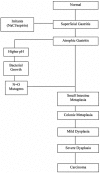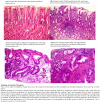Genetic Mechanisms and Aberrant Gene Expression during the Development of Gastric Intestinal Metaplasia and Adenocarcinoma
- PMID: 19412438
- PMCID: PMC2671722
- DOI: 10.2174/138920207783406460
Genetic Mechanisms and Aberrant Gene Expression during the Development of Gastric Intestinal Metaplasia and Adenocarcinoma
Abstract
Gastric adenocarcinoma occurs via a sequence of molecular events known as the Correa's Cascade which often progresses over many years. Gastritis, typically caused by infection with the bacterium H. pylori, is the first step of the cascade that results in gastric cancer; however, not all cases of gastritis progress along this carcinogenic route. Despite recent antibiotic intervention of H. pylori infections, gastric adenocarcinoma remains the second most common cause of cancer deaths worldwide. Intestinal metaplasia is the next step along the carcinogenic sequence after gastritis and is considered to be a precursor lesion for gastric cancer; however, not all patients with intestinal metaplasia develop adenocarcinoma and little is known about the molecular and genetic events that trigger the progression of intestinal metaplasia into adenocarcinoma. This review aims to highlight the progress to date in the genetic events involved in intestinal-type gastric adenocarcinoma and its precursor lesion, intestinal metaplasia. The use of technologies such as whole genome microarray analysis, immunohistochemical analysis and DNA methylation analysis has allowed an insight into some of the events which occur in intestinal metaplasia and may be involved in carcinogenesis. There is still much that is yet to be discovered surrounding the development of this lesion and how, in many cases, it develops into a state of malignancy.
Keywords: Intestinal metaplasia; aberrant gene expression; gastric cancer; genetic markers..
Figures



References
-
- Kim HS, Lee JS, Freund JN, Min KW, Lee JS, Kim W, Juhng SW, Park CS. CDX-2 homeobox gene expression in human gastric carcinoma and precursor lesions. J. Gastroenterol. Hepatol. 2006;21:438–442. - PubMed
-
- Cunningham SC, Kamangar F, Kim MP, Hammoud S, Haque R, Iacobuzio-Donahue CA, Maitra A, Ashfaq R, Hustinx S, Heitmiller RE, Choti MA, Lillemoe KD, Cameron JL, Yeo CJ, Schulick RD, Montgomery E. Claudin-4, mitogen-activated protein kinase kinase 4, and stratifin are markers of gastric adenocarcinoma precursor lesions. Cancer Epidemiol. Biomarkers Prev. 2006;15:281–287. - PubMed
-
- Matsukura N, Kawachi T, Sugimura T, Nakadate M, Hirota T. Induction of intestinal metaplasia and carcinoma in the glandular stomach of rats by N-alkyl-N'-nitro-N-nitrosoguanidines. Gann. 1979;70:181–185. - PubMed
-
- Sasajima K, Kawachi T, Matsukura N, Sano T, Sugimura T. Intestinal metaplasia and adenocarcinoma induced in the stomach of rats by N-propyl-N'-nitro-N-nitrosoguanidine. J. Cancer Res. Clin. Oncol. 1979;94:201–206. - PubMed
LinkOut - more resources
Full Text Sources
Other Literature Sources
